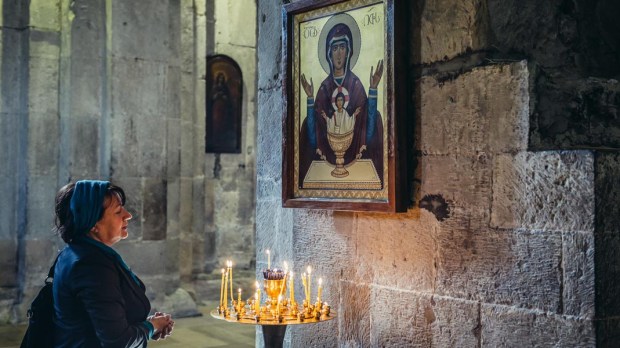U.S. President Donald J. Trump evoked images of the Cold War during his speech in Warsaw’s Krasiński Square Thursday, and reminded listeners of one Pole whose tenacity helped lead to the defeat of an atheistic communist regime.
“When the day came on June 2, 1979, and one million Poles gathered around Victory Square for their very first Mass with their Polish Pope, that day, every communist in Warsaw must have known that their oppressive system would soon come crashing down,” Trump said to applause. “They must have known it at the exact moment during Pope John Paul II’s sermon when a million Polish men, women, and children suddenly raised their voices in a single prayer. A million Polish people did not ask for wealth. They did not ask for privilege. Instead, one million Poles sang three simple words: ‘We Want God.'”
Poles were not alone. According to a recent survey from the Pew Research Center, religion has made a striking comeback throughout the region, especially since the breakup of the USSR. But that comeback seems often seems to be a form of nationalism, rather than true religion, the study suggests.
“Roughly a quarter of a century after the fall of the Iron Curtain and subsequent collapse of the Soviet Union, a major new Pew Research Center survey finds that religion has reasserted itself as an important part of individual and national identity in many of the Central and Eastern European countries where communist regimes once repressed religious worship and promoted atheism,” the survey reports:
Today, solid majorities of adults across much of the region say they believe in God, and most identify with a religion. Orthodox Christianity and Roman Catholicism are the most prevalent religious affiliations, much as they were more than 100 years ago in the twilight years of the Russian and Austro-Hungarian empires.
But relatively few Orthodox or Catholic adults in Central and Eastern Europe say they regularly attend worship services, pray often or consider religion central to their lives, Pew points out. For example, a median of just 10 percent of Orthodox Christians across the region say they go to church on a weekly basis.
Pew Research Center’s predecessor organization asked about religion when it surveyed several countries in the region in 1991, during the waning months of the USSR. In Russia, Ukraine and Bulgaria, Pew found, far more people said they were religiously unaffiliated in 1991 than describe themselves that way in the new survey. In all three countries, the share of the population that identifies with Orthodox Christianity is up significantly since the collapse of the Soviet Union, Pew says.
The research organization finds that Catholicism in Central and Eastern Europe has not experienced the same upsurge as Orthodox Christianity. This may be due to the fact that much of the population in countries such as Poland and Hungary retained a Catholic identity during the communist era, leaving less of a religious vacuum to be filled when the USSR fell, Pew says. In fact, the Catholic populations in some countries have become more secular than religious, especially in the Czech Republic, where the share of the public identifying as Catholic dropped from 44 percent in 1991 to 21 percent in the current survey.
In spite of that, Catholics in Central and Eastern Europe generally are more religiously observant than Orthodox Christians in the region. For instance, 45 percent of Catholics in Poland say they attend worship services at least weekly – more than double the share of Orthodox Christians in any country surveyed who say they go to church that often.
In the Orthodox majority nations of the region, a median of 70 percent say it is important to be Orthodox to truly share the national identity of their country. In Greece, for example 76 percent of the public says that being Orthodox is important to being “truly Greek.” Only a median of 57 percent in the four Catholic-majority countries say this about being Catholic.

